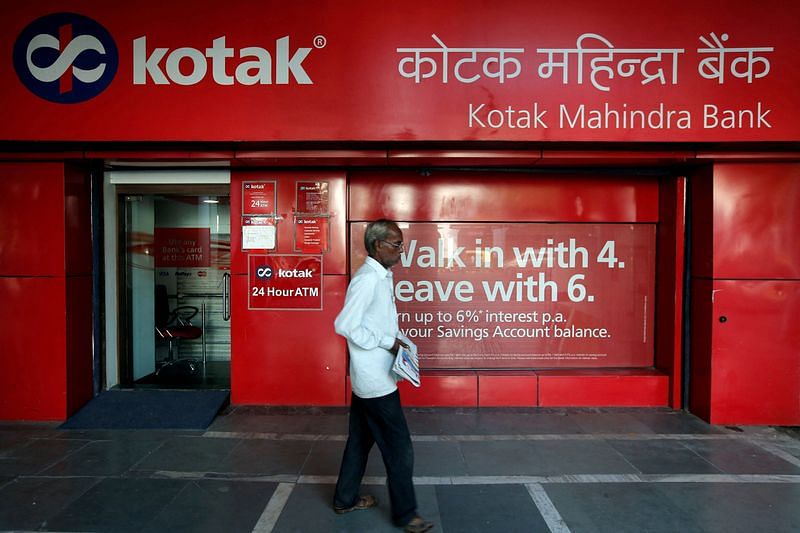By Siddhi Nayak and Jaspreet Kalra
MUMBAI (Reuters) -Kotak Mahindra Bank’s shares fell by nearly 11% on Thursday, a day after India’s central bank barred the lender that relies heavily on online banking from taking on new digital clients and issuing credit cards.
The Reserve Bank of India acted after the tech systems at Kotak, India’s fourth biggest private bank, failed to manage a surge in transactions.
Large numbers of customers signing up through its digital platform Kotak811 caused sporadic outages, two Kotak officials and two others with knowledge of the matter, speaking on condition of anonymity.
Shares in Kotak fell by as much as 13% to their lowest since November 2020, before paring losses slightly in late trade.
The lender is now valued at INR 3.67 trillion ($44.06 billion), and Jefferies cut its price target for the stock by 4%.
Kotak did not immediately respond to a request for comment.
It said on Wednesday it had adopted technology to strengthen its IT systems and that it believed the ban would not materially impact its overall business.
Kotak CEO Ashok Vaswani attempted to allay employee concerns, telling them in an email, seen by Reuters, “we will emerge stronger” and the issue would be resolved “in short order”.
But Macquarie Capital analyst Suresh Ganapathy said Kotak’s heavily digital business model meant the ban would hurt its medium-term growth.
About 95% of Kotak’s new personal loans by volume were disbursed digitally in the October-December quarter, while it issued 99% of new credit cards through digital channels.
“In our view, the fact that Kotak has also seemed reluctant in opening branches, with fewer than 350 branches opened in the last four years, is also an issue,” said Ganapathy.
The central bank did not say how long Kotak’s ban would remain. A similar ban on HDFC Bank, imposed in December 2020, was in place for 15 months.
“The issue could take at least six to nine months to get resolved and the ban could be lifted in about a year,” said Vinit Bolinjkar, head of research at Ventura Securities.
“Till then, we do see short-term impact on the bank in terms of potentially losing credit card market share to bigger rivals like HDFC Bank, ICICI Bank and Axis Bank,” he said.
Vaswani said Kotak’s “explosive growth” in business through its digital channels required a “completely different level of technology infrastructure”, which the bank has been building.
Kotak’s overloaded system caused failures on time-sensitive transactions on India’s popular real-time payment system, which facilitates interbank transactions through mobile phones, the sources said.
They requested anonymity as they were not authorised to speak to media.
While the RBI can impose monetary penalties for violations, analysts said they are not always effective deterrents.
“The RBI is taking a stance by imposing business restrictions to enforce adherence to regulatory standards,” Srinath Sridharan, a policy researcher and corporate adviser said.
The central bank’s increased scrutiny of banks and other financial firms has resulted in a spate of supervisory restrictions, including halting operations at Paytm Payments Bank in January.
($1 = 83.3340 Indian rupees)
(Reporting by Siddhi Nayak and Jaspreet Kalra in Mumbai; Additional reporting by Sethuraman NR and Chris Thomas in Bengaluru; Writing by Swati Bhat; Editing by Edwina Gibbs, William Mallard and Barbara Lewis)
Disclaimer: This report is auto generated from the Reuters news service. ThePrint holds no responsibilty for its content.
